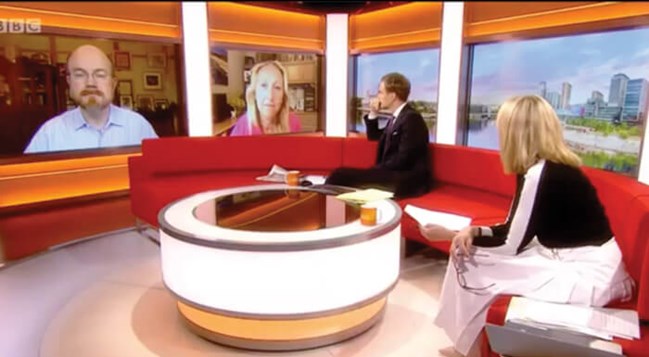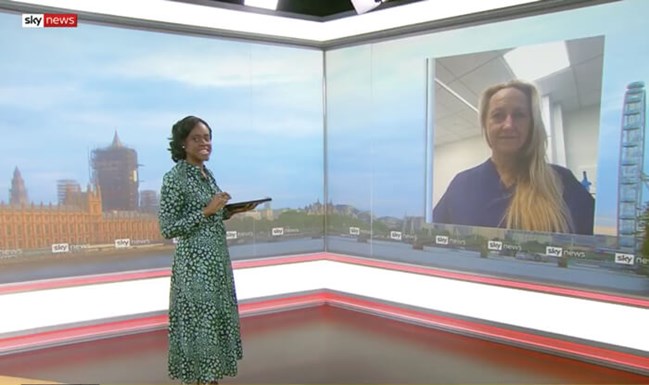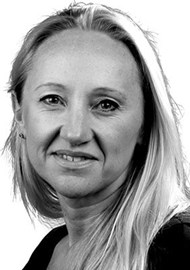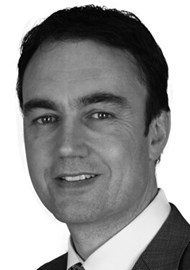There can be few ENT surgeons who have had such a pivotal role in the COVID pandemic as Claire Hopkins. She has been instrumental in changing the diagnostic criteria, and has been a frequent presence in the media, as Sean Carrie discovered when he spoke to her.
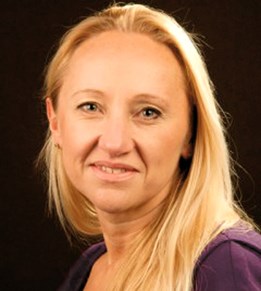
You have been at the forefront of the impact of COVID-19 research. Tell us how that happened?
In March 2020, at a time when we naively thought COVID was restricted to those returning from Italy and China, I started seeing a rapid increase in patients with sudden onset anosmia. Speaking with colleagues online from Italy, France and the US confirmed this was widespread, and that high rates of anosmia were being reported in frontline staff on COVID wards. With the backing of ENT UK, I released a press statement to raise awareness. This triggered a media storm, but also lead to invitations to collaborate with research teams across the globe. It was very much a result of this very generous, open and collaborative response that we have been able to achieve so much in a relatively short space of time.
How did you persuade the Department of Health to alter their clinical diagnostic criteria for COVID-19 infection?
With difficulty! I first engaged in discussions with the SAGE/NERVTAG groups in mid-March. Initially, and quite understandably, they wanted strong evidence before adopting changes. However, even after we had been able to produce this from many sources, it took too long for loss of smell and taste to be adopted into the diagnostic criteria. I believe this was largely due to relying solely on their own data from the early UK cases showing that the addition of smell loss did not increase the pick-up rate in addition to cough or fever. However, this itself was flawed by selection bias, as the only way to get tested at that point was to have either cough or fever! In the end, we used the media and widespread public support to drive the change.
“Our first press release travelled the world overnight – I am quite certain we would not have achieved what we have done without the power of the media”
How did you manage the storm of publicity yourself?
With even more difficulty… Certainly, in the early stages it was quite overwhelming, but as the most important aim of my work with COVID-19 has always been to raise public awareness - firstly, of the need to self-isolate in cases of smell loss, and secondly, of the support available to those with ongoing olfactory dysfunction, the role of smell-training etc - it’s been really important to embrace it. I still haven’t been able to watch myself in any of the TV interviews, but there is no better way to reach the public – a recent interview on Sky News had half a million views online within a few days. Our first press release travelled the world overnight – I am quite certain we would not have achieved what we have done without the power of the media.
Prof Hopkins appeared on the BBC to discuss the lost of taste and smell
as being one of the earliest occurring symptoms of COVID-19.
CLICK THE IMAGE ABOVE TO SEE THE INTERVIEW
Prof Hopkins discussed smell testing on Sky News for people suffering from anosmia following COVID-19.
CLICK THE IMAGE ABOVE TO SEE THE INTERVIEW
Patient feedback suggests smell disorders, in general, remain poorly assessed and managed. How can we as a profession improve upon this?
I think patients are largely aware that therapeutic options are currently limited; what they want from an appointment is compassion, hope and reassurance. This often seems to be missing and they are sent away within minutes, occasionally with an ill-thought comment such as ‘it could have been worse’ (or something actually worse). We should be treating smell loss in the same way we do hearing loss – looking for treatable causes, and providing support when treatments are not available. Many reading this will quickly say ‘It’s not the same as going deaf’, but for patients it’s devastating. Hopefully COVID will have a silver lining and attract more research funding in this area, and ENT should be at the forefront of this work.
Your own academic interests lie with CRS and you have been a key leader in the EPOS guidelines. Do you feel we are on the edge of a major breakthrough in terms of patient management?
Biologics are set to be a game-changer in the management of nasal polyps, but we have a huge challenge to get these approved by NICE for use in the UK. It’s incredibly frustrating to have seen the significant benefits in patients enrolled in trials, yet be unable to offer them to my most difficult-to-treat patients, such as those with Samter’s, even though they are now widely available across Europe and the US. The British Rhinological Society is currently developing guidance which we hope will help address this, but it is going to take time. I realise that we, working with our subspecialty organisations, have an important role to play as patient advocates, as well as representing our members.
“The world is definitely changing with regards to equality and diversity– it’s a privilege to be able to help that”
What piece of research are you most proud of?
Definitely my work on the UK audit of surgery for chronic rhinosinusitis and nasal polyps, as it laid the foundation for everything that followed. It gave rise to the SNOT-22, on which I have had the opportunity to travel the world. It remains the gold standard of outcome research in CRS and we are still learning from the data even now. I hope that we can make a similar success of the MACRO programme in driving forward research in CRS.
You have been a strong advocate of raising issues of unconscious bias in surgery. Tell us about your experience and the impact in our own subspecialty.
I have been extremely fortunate in my career to have been well supported throughout but, in particular, had the benefit of fantastic role models in Professors Valerie Lund, Wytske Fokkens and Janet Wilson, who became not only mentors but good friends. Yet we still work in a profession where unconscious bias and inequality remains fairly commonplace. Each event, albeit sometimes nothing more than a minor annoyance at the time, starts to have a cumulative negative impact. As I’ve described before, a lifetime of almost imperceptible slights can start to erode confidence. I feel I’m now in a position where I can help to highlight this, and indeed have a duty to do so for those that follow, just as Valerie and others have done before me. What has been really rewarding is the positive responses I have had from both male and female colleagues. The world is definitely changing with regards to equality and diversity– it’s a privilege to be able to help that.
Life is particularly challenging for trainee surgeons at this time. What advice do you have for those struggling to progress their training?
It must, indeed, be very difficult, especially during periods of redeployment and suspension of elective work. However, I am amazed at how our trainees have risen to the challenge and really proven themselves to be invaluable future colleagues too. I think it’s important to remember that it doesn’t matter how long it takes to reach the end point - I was an LTFT trainee and hated the feeling of being left behind, but as soon as you start as a consultant you realise it makes no difference and you are all on an equal footing. You also realise that training is really just laying the foundations and you continue to develop your surgical skills throughout your career. Obviously, the challenge for our trainees is making sure that foundation is strong enough – perhaps some thought should be given to allowing greater subspecialisation in training during these difficult times.
“We should be treating smell loss in the same way we do hearing loss – looking for treatable causes, and providing support when treatments are not available”
It is certainly true that I have little used some of the surgical skills I learned as a trainee since becoming a consultant, and perhaps the opportunity I had to do middle ear implants, for example, might more usefully have been given to someone else if there were limited cases on offer. I certainly don’t envy either our trainees or training programme leads at the present time. However, we must take some comfort from having job security in the midst of a time of great uncertainty and make sure we support each other and the wider teams that we work with.
As the President of the British Rhinological Society, can you tell us how the Society has adapted to the challenges of COVID-19?
We have been working hard, in collaboration with ENT UK, to provide guidance for our members both on the provision of care, management of anosmia and other important issues related to COVID. The BRS Juniors group held a very successful virtual training day, and Raj Bhalla, our President Elect, has been hosting online Grand-Rounds. It’s sometimes a challenge to provide educational material without leaving us all feeling ‘zoomed out’, but I hope we have got the balance right. We are working on the forthcoming meeting in May and will be circulating information soon. I am really proud that the BRS have been at the forefront of raising awareness around COVID and anosmia, and hope that I have made the most of the platform given to me as the President.
We are all looking forward to the European Rhinologic Society meeting in Thessaloniki, postponed until September 2021. You are the Society Treasurer. How are plans progressing and what sort of meeting can we expect?
We are hoping to hold a hybrid meeting, given that the vaccine roll-out will allow some, although likely not all, to travel and hopefully the worst of the pandemic, in terms of the demands on healthcare systems, will have passed. The scientific programme is nearly complete and it looks set to be a fantastic meeting however you choose to attend. I am very much looking forward to presenting to a real audience instead of a computer screen, heated panel discussions and debates on controversial topics (almost impossible online) and perhaps even being able to find time for a mojito on a rooftop bar… I hope to be able to see you there and raise a glass together.
“I was an LTFT trainee and hated the feeling of being left behind, but as soon as you start as a consultant you realise it makes no difference and you are all on an equal footing”
You always seem incredibly busy here and overseas! Many individuals have been re‑evaluating work life balance over the past year. Has ‘lockdown’ allowed you to step off the ‘treadmill’ for a while?
With both COVID and unrelated research, leadership roles, clinical work and the added joys of home-schooling, I have honestly never worked harder in my career. I have really missed the interactions (both social and scientific) that meetings and conferences bring, and yearn for the time that these will resume. I even miss the time I used to spend on a plane simply to disconnect from my emails and watch a movie, and really need to find the time to get back on a treadmill at some point! However, it’s also been great to spend more weekends at home with my family so I will likely be more selective as to when and where I travel – I think hybrid meetings will become the norm and for the sake of both the planet and our sanity, I think we will all travel less and continue to zoom into each other’s lives in the future.

